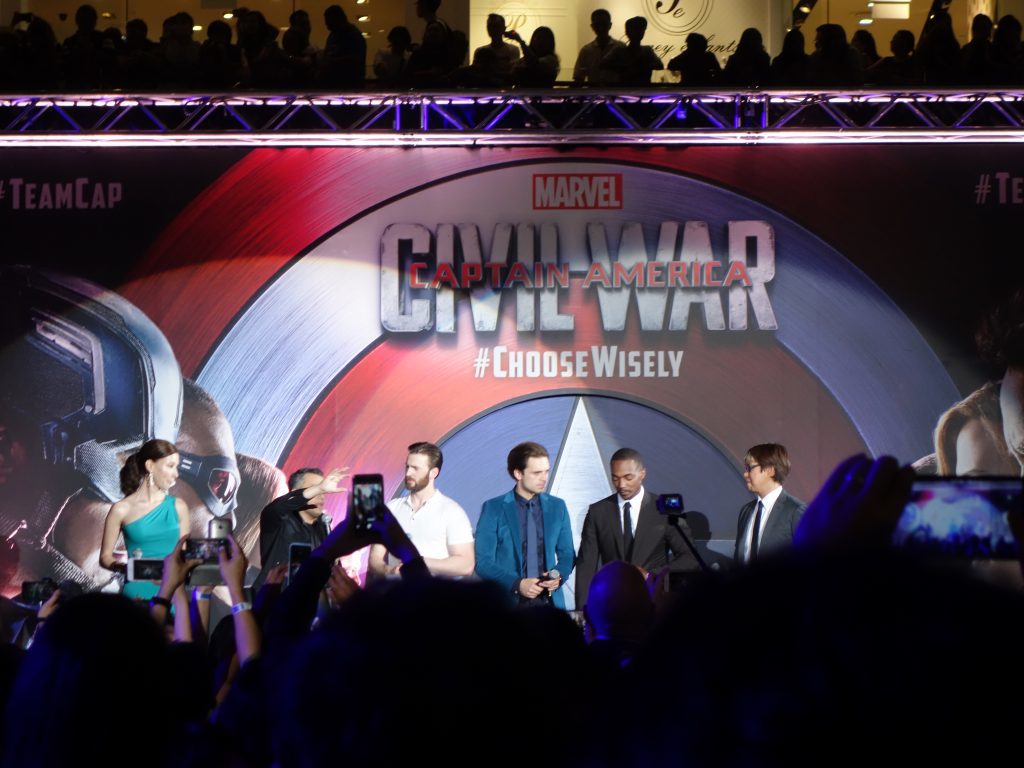(1) NORTH CAROLINA FAN EVENT AWAITS DEVELOPMENTS. Walker Stalker Con has announced that they are postponing their 2016 Charlotte, NC event until December to give the North Carolina state house a chance to repeal NC HB 2 (or the courts to throw it out).
Steven H Silver adds, “Just last night, I was wondering if conventions and conferences (not just in NC) would start to try to include a clause which allows the event to pull out of the venue without penalty if the state government passes discriminatory laws.”
(2) HAVING FUN YET? Geek Crusade analyzes “How (almost) everything went wrong at the Civil War blue carpet”. Apparently this was a celebrity event in Singapore. I don’t even know what a “blue carpet” is, so let me turn this over to the experts….
As the time neared for fans to be let into the skating rink, the crowd swelled to a ridiculous size and effectively blocked off any sort of access to the food court or the surrounding shops itself. And when VIPs and fan zone winners asked where they could queue up for entry into the rink, no one had any answers for them.
So about 20 minutes before we were let in, I was queueing in the corner of the rink (marked “Access point for inner sanctum” in the picture at the top of this post), right smack in the middle of a big crowd. That one access point was where everything went in and out, so at one point I had trays of hot food for VIP guests brushing past my left, while random people kept pushing me from behind or squeezing in front of me to get to the escalators. I was quite literally trapped on all sides.
To make things worse, when members of the media started going in with bulky equipment, I got pushed around a lot because there was literally no more space to move or to let people through. And people were STILL trying to push their way through the crowd to try and get closer to the rink. That bottleneck was a serious fire hazard, and at one point I seriously thought that I’d never get out of this bloody event unharmed….
(3) YOU PAYS YOUR MONEY. Geek Crusade also has this post – “’I paid $688 for the Civil War blue carpet package and I loved it’”
One fan flew all the way in from Brunei for the chance to meet Cap, Falcon and Winter Soldier.
So after all that hoohah about the $688 and $1288 packages for the Civil War blue carpet, there’s only one question left to ask: Was it all really worth it?
In the run up to the event, many fans had contacted Geek Crusade for more information about the blue carpet. But we soon realised that one of them had actually purchased a $688 package, before the packages on offer mysteriously disappeared from the event page. (Reed Exhibitions later told The Straits Times that the packages had sold out)
(4) HOW SHE FOUND FANDOM. MidAmeriCon II chair Ruth Lichtwardt ponders, in “A Reflection on the Hugos”.
In the long-ago days before email and about when ARPANET was becoming the Internet, there was a young woman who was a fan but not in fandom. She barely knew of the existence of fandom, and if any of the people around her were SF fans, they didn’t talk about it because it was somehow lowbrow. But she had read all the Bradbury, Bradley, Heinlein, and Le Guin in her school libraries. She loved books, and reading, and SF, and fantasy, and somewhere along the way had become aware that in far away places there were people who thought SF was pretty cool and authors won awards for this stuff, prestigious awards, a thing called the Hugo Awards. But these were the pre-internet days and news about this was not widely circulated unless you knew where to look.
The young woman went off to college. One day she stopped by the office of one of her professors and was standing in the doorway talking with him. On his desk was a beautiful silver rocket on a wooden base. “That’s a really lovely sculpture,” she said. “Thank you,” he replied, “That is my Hugo.”
That was the day that I learned that the Hugo Awards were not some unobtainable honor given only to mythical, unapproachable authors by mysterious deities. That shiny rocket had been bestowed on James Gunn for “Best Related Work”, his biography of Isaac Asimov. The book had been chosen by the biography’s actual readers, by science fiction fans, as deserving of the award. To me, that made it even more of an honor….
.@TheHugoAwards Nominees drop tomorrow! Today we hear from #MACII Chair Ruth Lichtwardt https://t.co/uG7A8qxtnw pic.twitter.com/8wduRljXuv
— MidAmeriCon II (@MidAmeriCon2) April 25, 2016
(5) THE PINOCCHIO GAMBIT. If you’re one of the people who told a friend you nominated them for the Hugo, and they went and blabbed it all over the internet, what are you going to do when they find out they’re not on the final ballot tomorrow? Don’t fret. Order your friend a set of these Rocket-shaped salt and pepper mills and tell them they already won!
(6) WHO BENEFITS? John Scalzi spotlights the way Kindle Unlimited compensates authors in “Scammers and Fixed Pots” at Whatever.
…(Nor is adjusting one’s work to take advantage of the market a problem; publishers have always done this. Is the money is cheap paperbacks? They will make cheap paperbacks. Is the money in hardcovers? They’ll make hardcovers. What, novellas are the next big thing? They’ll all make novellas! Likewise, if Amazon is saying to self-pubbed authors (and, by extension, scammers) “[X] is the way we decide to pay you,” then it’s rational to do [X].)
The problem with the Kindle Unlimited scammers isn’t really the compensatory triggers of KU or the fact that everyone, legit author or otherwise, is looking for the way to squeeze as much money as possible from it. The problem is: who bears the immediate economic brunt of the scammers taking advantage of whatever scheme Amazon decides upon? Well, it’s not Amazon, that’s for sure, since its financial exposure is only what it wants to pay out on a monthly basis; scammers in the system or no, Amazon only pays what Amazon wants to pay. The readers also get off lightly; their economic exposure is only they flat fee they pay to access KU.
So that leaves the actual authors, whose share of a fixed amount of money is being diluted by bad actors who see how the system can be gamed and are cheerfully gaming it as fast as they can….
(7) SPEAKING OF MONEY. The BBC’s piece “If cryonics suddenly worked, we’d need to face the fallout” deals a glancing blow to the discussion in today’s comments.
…It is possible, however, that money will no longer exist by the time cryonics pays off, and that people will not have to work for a living. A society that has achieved the medical breakthroughs necessary to cure disease and end aging, Kowalski and others believe, may also be one bereft of poverty and material want. In such a scenario, clothing, food and homes, fabricated with 3D printers or some other advanced means, would be abundant and freely available. “It doesn’t make sense that they’d take the time to revive people into some dystopian, backward future,” Kowalski says. “You can’t have the technology to wake people up and not have the technology to do a bunch of other great things, like provide abundance to the population.”
Still, even if cryogenically revived persons come back to a more equitable and advanced future, the mental flip-flops required to adjust to that new world would be substantial. Dislocated in time, alienated from society and coming to grips with the certainty that everyone and everything they had ever known is irretrievably lost, they would likely suffer symptoms of intense trauma. And that’s not to mention the fact that some may have to deal with a whole new body because only their head was preserved.
(8) EX MACHINA. Abigail Nussbaum delves into the issues raised (and some missed) by the movie “Ex Machina”. BEWARE SPOILERS. Scores high on bringing to my attention new ways of thinking about things. (Will they be new to you? I guess there’s only one way to find out.)
While I agree with [Laurie] Penny about the anxiety that underpins these stories [about fembots], I think that I would take a step further, and suggest that they–and Ex Machina in particular–are getting at the more fundamental question of what being a woman actually is. As much as it raises feminist issues, Ex Machina makes much more sense to me when read through a trans lens, as the story of Ava’s becoming–unwillingly, and only as a means of survival and escape–a woman.
(9) SF’S VANISHING COMPETENCE. Charlie Jane Anders’ io9 post, “The Moment When Science Fiction Split off From Competence Porn” is recommended by Gregory N. Hullender as an “Interesting article about how mainstream shows and movies have ultra competent technical folks but SF shows have incompetent people. Anders suspects it’s because lots of people are overwhelmed by new technology these days and they like post-apocalypse stories because they let us return to a simpler world.”
…[The], the original Star Trek mostly shows the Enterprise crew being pretty competent, but now we’re only allowed to have science explorer heroes if the focus is on the captain being unqualified for his rank.
But meanwhile, “competence porn” is our most popular entertainment, in the movies as well as television. Medical shows (like House) and forensic/detective shows (like CSI or Bones) celebrate the hero who has godlike powers of reconstructing the past and figuring out exactly what’s happened. There are detectives who can tell whether you’re lying at a glance, or who can reconstruct a complicated crime scene by looking at a few twigs, Sherlock-style.
And as we wrote a while back, every police procedural and spy show (or movie) has to have the stock “nerd” character, the slightly loopy guy or gal who can hack into any computer or zoom-and-enhance any video. There is an army of incredibly brilliant, nigh-omnipotent nerds on television….
David Brin has his own take on why this happens: authors are lazy.
“How SF split off from ‘competence porn’.” The latter genre – like The Martian – thrills fans with a can-do spirit that used to be core to science fiction, both on-page and on-screen. In io9, Charlie Jane Anders writes: “This shift coincides with the decline in space opera on television, and the rise of apocalypses and “disaster porn,” which are at least partly a wish-fulfillment fantasy about life becoming simpler and less confusing again. We have ‘competence porn’ in the present day, but when we imagine the near future, we reach for ‘disaster porn.’” I revere Charlie Jane for (among other things) clearly citing the current, largely dismal mood in SF as dull, unimaginative and unhelpful, contributing to decayed confidence in real life problem solving.
Where I part company is over why. This is not a matter of near-future vs far. Competence and hope – set amid thrilling danger and good writing – can be found in SF set amid all kinds of futures — near, middle and far — as evoked by Stargate and Firefly, by the works of Banks and Vinge. (And some of the rest of us try, as well.) No, the plague of zombies and apocalypses and illogically red-eyed dystopias has one central cause — laziness.
(10) INFORMATION WANTS TO BE FREE. This is a week old, but here’s an epic example of trying to work the system – “’Game of Thrones’: Journalist Files FOIA Request for President Obama’s Season 6 Screeners”.
A day following the April 13 news that President Obama will receive early screeners of the highly anticipated Game of Thrones season six episodes, a journalist requested through the Freedom of Information Act that he “share his advance screeners” with the public.
Though HBO announced in early March that no members of the press will receive advance screeners, unlike in past seasons, a journalist is still trying. On Friday, Vanessa Golembewski revealed in a Refinery 29 article titled “Only Obama Gets Game of Thrones Screeners, So I Filed an FOIA Request for Them” that an FOIA request was filed on Thursday in an attempt to obtain the episodes….
Upon learning that Obama would come to know the fate of three of the show’s stars before the rest of the waiting global audience, Golembewski reasoned in the application: “If the president — and by extension, our government — is in possession of a file, surely that file is subject to my request to see it as a U.S. citizen.” In the “description” section of her web application, Golembewski penned, “I would like President Obama to share his advance screeners for Game of Thrones with the public” and filed “$0” as the amount of fees she would be willing to pay for the information.
(11) AND ONE MORE THING TO COMPLAIN ABOUT. By all means, get emotional over the change in the Cracker Jacks packaging, and weep that those cheap little prizes have been replaced with QR codes to access a game app. Gizmodo leads the Greek chorus —
Truth be told, the prizes inside Cracker Jacks haven’t been that cool for some time. There used to be decoder rings and toy figurines. In the most recent “box” of Cracker Jack that I ate, I got a temporary tattoo. But they were prizes! They were real. They did not require a smartphone to appreciate them.
A world with prize-less Cracker Jack is not a world I want to live in, but I think I’m more upset about the loss of the box. The Uncanny Valley-ization of Sailor Jack and his dog Bingo in the logo is awful enough, but taking the box away is an affront to baseball fans everywhere.
(12) SHAKESPEARE V. FAKESPEARE. The Digital Reader brings you an “Infographic: Fourteen Amazing Shakespeare Facts (Including a False One)”.

[Thanks to John King Tarpinian, Bruce Arthurs, Will R., Mark-kitteh, Steven H Silver, Gregory N. Hullender, and David Doering for some of these stories. Title credit goes to File 770 contributing editor of the day Soon Lee.]


